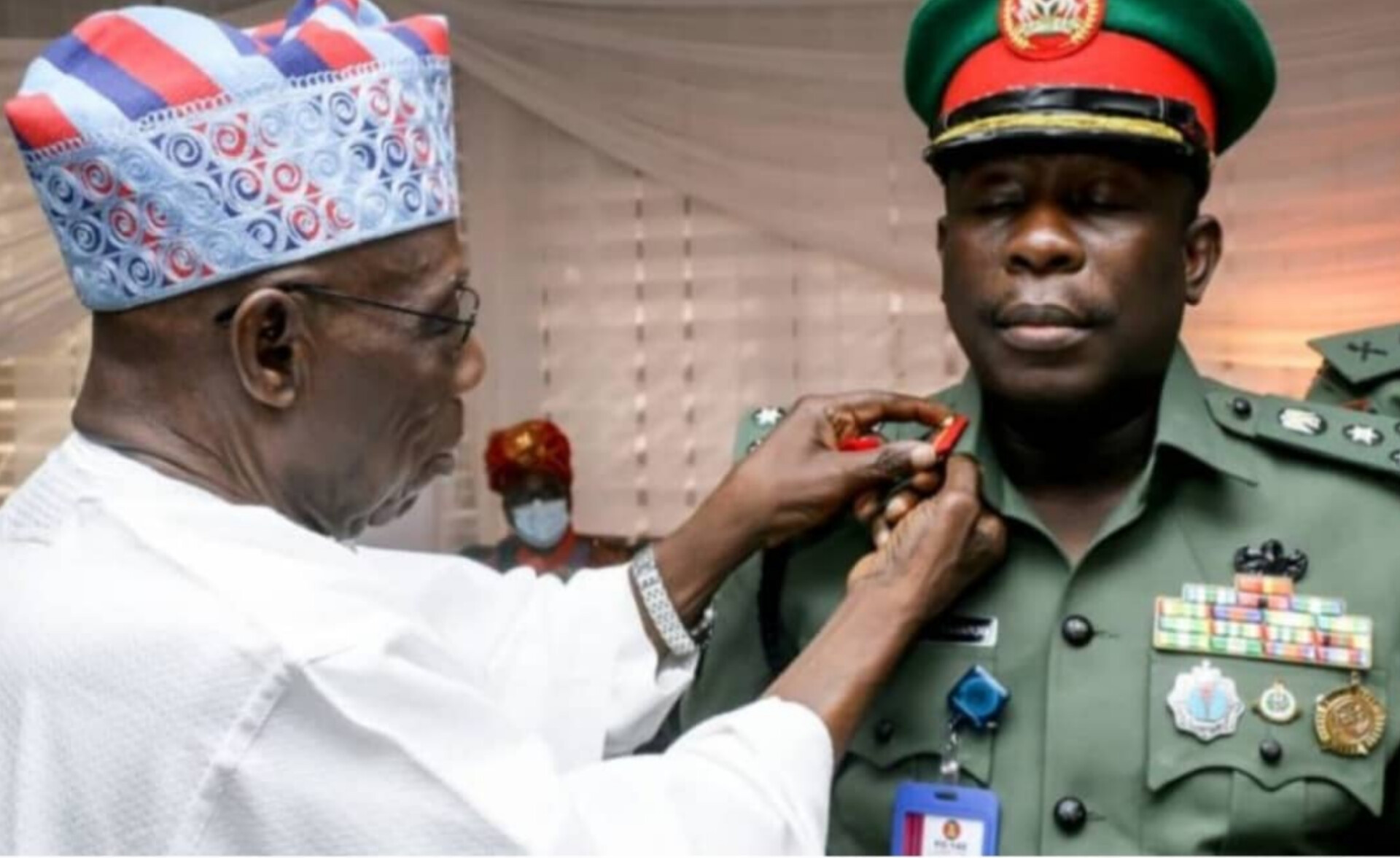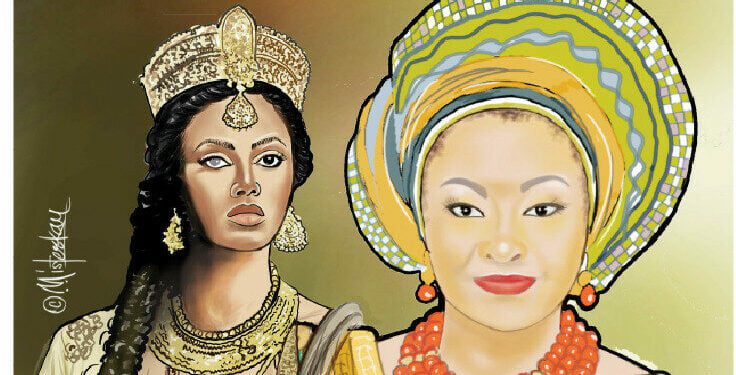By Tunde Olusunle
Let me begin by making a distinction here. Nigeria’s military acknowledges two Obasanjos in its records. One has been retired for nearly 45 years now, while the other was at best a toddler when the older disengaged froam military service. Both of them made it to the uppermost crust of the military, the former rising to the exclusive club of “four star” Generals,” while the latter is a “one star” General. He will be decorated Major General, a “two star” General on his next elevation. One is the father, Olusegun Obasanjo, the first Nigerian to serve both as military Head of State, and democratically elected President. Muhammadu Buhari is the only other Nigerian thus far to savour this distinction. Even at that, Obasanjo bests Buhari in terms of length of stay in office. Succeeding Murtala Ramat Mohammed who was cut down by the bullets of coupists in February 1976, Obasanjo was military leader for three and half years.
He handed over to a democratically elected President, Shehu Usman Shagari on October 1, 1979. Buhari on the other hand, was a little over two and half years in office when he was torpedoed August 27, 1985 by Ibrahim Badamasi Babangida. Both of them served out two terms of four years each as civilian Presidents. Their records of performance will be discourse for another day. But the more vocal Obasanjo echoes the views of many Nigerians to the effect that Buhari, multi-sectorally, was a grand failure. The other Obasanjo, in the Nigerian Army is Adeboye, son of the former whose name when interpreted and approximate age suggest that he was sired while his father was in office. Father and son as combatants have variously featured in the thick of firefighting. Olusegun Obasanjo still wears in the peri-scrotal section of his physiognomy, a scar of a bullet wound from the thick of battle during the Nigerian civil war. Adeboye as a Lieutenant Colonel was shot in the leg September 2014, while leading his troops for an onslaught on Baza, Adamawa State, an extension of the hydra-headed Boko Haram crisis in the country’s North East.

I had the privilege of working with the older Obasanjo for over eight years. I was drafted into his immediate campaign team, ahead of his formal declaration to run for Nigeria’s presidency in the lead up to the current fourth republic in November 1998. Pervading cynicism about military involvement in the nation’s politics was a potent albatross on Obasanjo’s path. Popular experience with the regimes of Buhari, Ibrahim Babangida and Sani Abacha impugned national trust and believability in the military establishment. Between these three rulers, Nigeria’s second republic was aborted on December 31, 1983, while the goalposts of the wholesale democratisation of national politics was interminably shifted.
Obasanjo was also a hard sell among his Yoruba kith in South West Nigeria many of whom still harbour misgivings about Obasanjo’s management of the 1979 presidential election which produced Shagari. There is a school of thought which still believes that the revered attorney, nationalist and entrepreneur Obafemi Awolowo should have been declared President after the 1979 polls. South westerners equally opine that the region never enjoyed any special developmental privileges under Obasanjo’s military rulership and couldn’t understand why they should support him. Our job as Obasanjo’s makeover professionals under the leadership of the Emeritus editor and economist, Onyema Ugochukwu, was therefore cut out.
Among other strategies thefore, we deliberately subsumed his towering military rank, in all references to him. We played up his traditional honours and titles. Arising from his exploits during the 30-month Nigerian civil war which ended in January 1970 and his subsequent emergence as military leader, Obasanjo had garnered a long list of indigenous honorifics. As campaign policy therefore, Obasanjo would be addressed as “Chief.” I recall this particular day when we Obasanjo’s aides walked him from his Aso Villa office to the residence through the connecting walkway. Obasanjo observed as we strolled with him that his name had been inscribed on the lawn behind his office.
The title “General” resurfaced on the manicured grass and Obasanjo started a debate about the reinvention of his name in this format. Solomon Giwa-Amu of blessed memory who was aide de camp, (ADC) to Obasanjo jocularly explained how it came about. He said there was a debate between him and the chief security officer to President, (CSO) the President, Kayode Odunneye at the time, about the appropriate Obasanjo title that should be communicated to the horticulturist. Odunneye, according to Giwa-Amu suggested it should be “Chief.” He, Giwa-Amu, however, argued that Obasanjo was first a General before he was recognised by his constituents and festooned with scores of chieftaincy titles. Foregrounding Obasanjo’s military rank in that particular instance therefore, became more compelling. As a virtual constant on Obasanjo’s entourage on his foreign trips, I noticed in several banners, brochures and mementos prepared to commemorate his visits that the name of Nigeria’s enigmatic former President was couched in several ways. He was either “His Excellency, Olusegun Obasanjo” or “His Excellency, Mr Olusegun Obasanjo” or even “President of Nigeria.” Neither his military nor chieftaincy appellations were prefixed to his name.
Friday September 15, 2023, General Obasanjo resurfaced in Oyo State. It was the commissioning of the 38 kilometre road linking Oyo with Iseyin, two major towns in Oyo State and the governor of the state, Seyi Makinde, had invited Nigeria’s former leader as guest of honour at the event. Makinde’s effort by the way is commendably audacious and visionary. He has opened up vast sections of Oyo State for development. Obasanjo arrived the venue in the company of his host who very fittingly is the age of his biological children. Obasanjo, schooled and skilled in official protocol, observed an aberration in the proceedings. The audience didn’t rise, out of courtesy, to acknowledge the arrival of his host Makinde, and his good self at the event. Not one to brook such “misconduct,” he spoke his mind once he took possession of the microphone at the ceremony.
Obasanjo reminded his host audience about two major canons in Yoruba tradition. Deference is customarily accorded to age and authority, he lectured. Didn’t we recently see viral images of Abiodun Abayomi Oyebanji, 55, governor of Ekiti State prostrating full length to pay respect to the nonagenarian attorney and statesman, the 93 year old Afe Babalola? That is deference to age and seniority. There is also the flip side, the imperative of according honour and respect to authority irrespective of the age of the occupant of the office. Obasanjo himself was pictured kneeling before the Olu of Warri, Ogiame Atuwatse Utieyinoritsetsola Emiko, who can pass for his grandson, at his installation two years ago, in conformity with tradition. Obasanjo noted deserved respect for authority was not demonstrated at the Oyo event. The military streak in Obasanjo spontaneously overwhelmed him. He ordered the royals like a commander, to rise up to their feet. This he noted should be the standard practice if a governor or President were being welcomed. Instantaneously, he ordered the royal fathers to sit down.
Ever in the eye of the storm, Obasanjo’s act at that event has elicited and continues to elicit reactions and controversies. He has been upbraided and castigated for “blasphemy” against the Yoruba traditional institution by the
Council of Yoruba Elders, (CYE). A statement issued by the body and e-signed by Victor Taiwo and Lanre Ogundipe, lambasted Obasanjo for an act considered ” infra dignitatem to Yoruba culture and tradition and a taboo.” The release accused Obasanjo of denigrating and desecrating Yoruba royalty who are considered igba keji orisa, (second-in-command to the deity).
Elsewhere, a certain “Adejare Ibrahim” purportedly resident in Oyo Alaafin has written a rejoinder titled “Now, the truth is coming out gradually,” which continues the Obasanjo-bashing. He submits in the piece that the former President came to the event specifically to exact his pound of flesh out of the Olugbon of Orile-Igbon, Francis Olusola Alao, Vice Chairman of the Oyo State Council of Obas and Chiefs. The Olugbon reportedly featured on a radio programme ahead of the February presidential poll where “he berated Obasanjo for his support for the candidacy of Peter Obi of the Labour Party, (LP). Such has been the diversity and magnitude the fire stoked by Obasanjo’s recent outing.
A statement authored by “Dr John Adebayo Abolarin” dated September 16, 2023, appears to be what my approximate my reading of the “Obasanjo vs Oyo traditional rulers” saga would be. Abolarin suggests that Obasanjo in reality was “fighting” for Makinde whose omoluabi simplicity appeared to have been taken for granted by the royals. The unassuming, unobtrusive Makinde it would seem is not fastidious about protocol and officialdom. Obasanjo believes Makinde who will be 56 on his next birthday in December deserves respect from all and sundry on account of the position he occupies. Abolarin proposes that “it was not the Obas that were humiliated by Obasanjo. It was rather the governor who was dragged on the floor on that occasion.”
As one who has officiated at functions which had Presidents in attendance, the blame for the Oyo slur should be shared between the Government House protocol team and the Master of Ceremony. It is the responsibility of the protocol department to furnish the MC, especially if he is not from the governmental system, with the programme brochure and list of expected dignitaries. The MC should be prompted to respectfully invite the audience including the traditional rulers to rise to their feet to receive the August guests once they arrived the venue. That tutoring should come from the protocol unit. It needn’t have awaited Obasanjo’s assumption of that responsibility.
I conclude by observing that the typically witty Obasanjo could have chosen like a rat, to nibble at the toes of the deep sleeper, while fanning at those toes simultaneously. How about this as suggested remarks by Obasanjo: “I respectfully greet you royalties and salute the people of Oyo State on this auspicious occasion. You all know me well so I need no reintroduction. I’m here as guest of your son, my son your Governor, Engr Seyi Makinde who is doing so well for your state in my view. For his status as chief executive of this state, protocol demands that you rise to receive him at a function like this. Governor Makinde may be a gentleman who doesn’t bother about ceremonials and fanfare, though”
“Today, however, I am here and I want to correct this. We should give honour to whom honour is due at all times. This is particularly important on an occasion like this when the Governor is hosting a former President. The minimum this audience should do is to rise to receive him and his guest, just as Makinde the “omoluabi” that he is pays obeisance whenever he comes to your palaces, just as I do whenever I visit you. I imagine that not too many Obas and Baales at this event are older than I am. Shall we then be up standing, please?… Thank you, Your Highnesses. We may all be seated now.” We should be mindful, however, that Obasanjo is just a few years to becoming a nonagenarian. This proverbial fire-dried fish, will certainly and surely be difficult to bend!
Tunde Olusunle, PhD, poet, journalist, scholar and author is a Member of the Nigerian Guild of Editors, (NGE)



